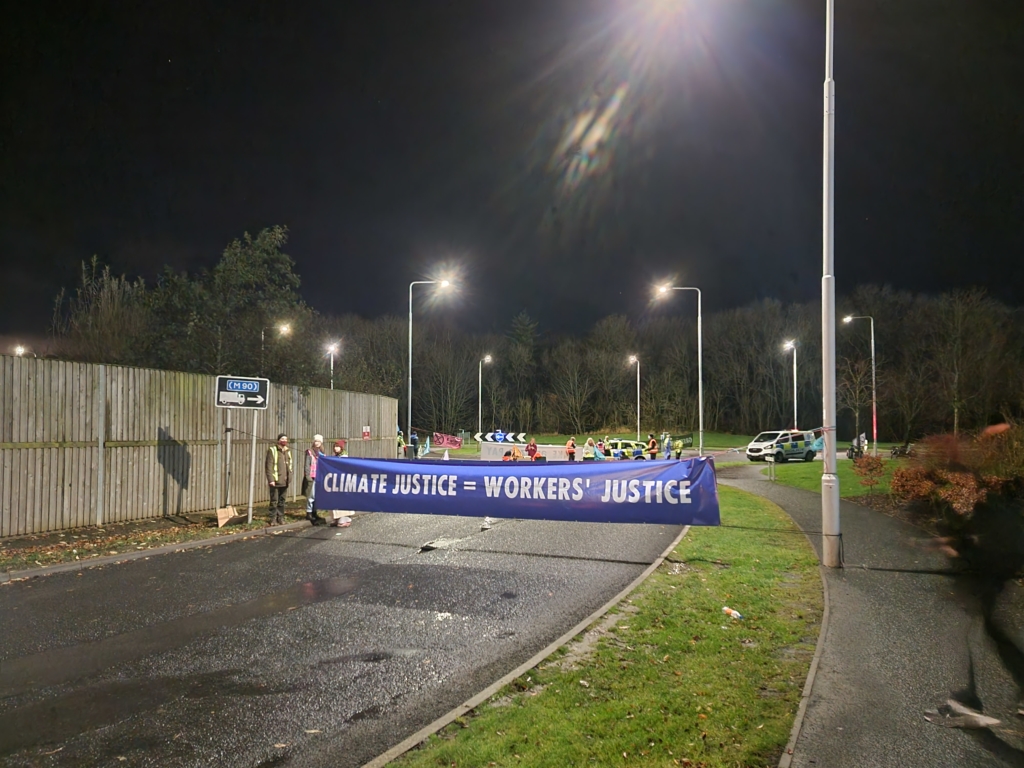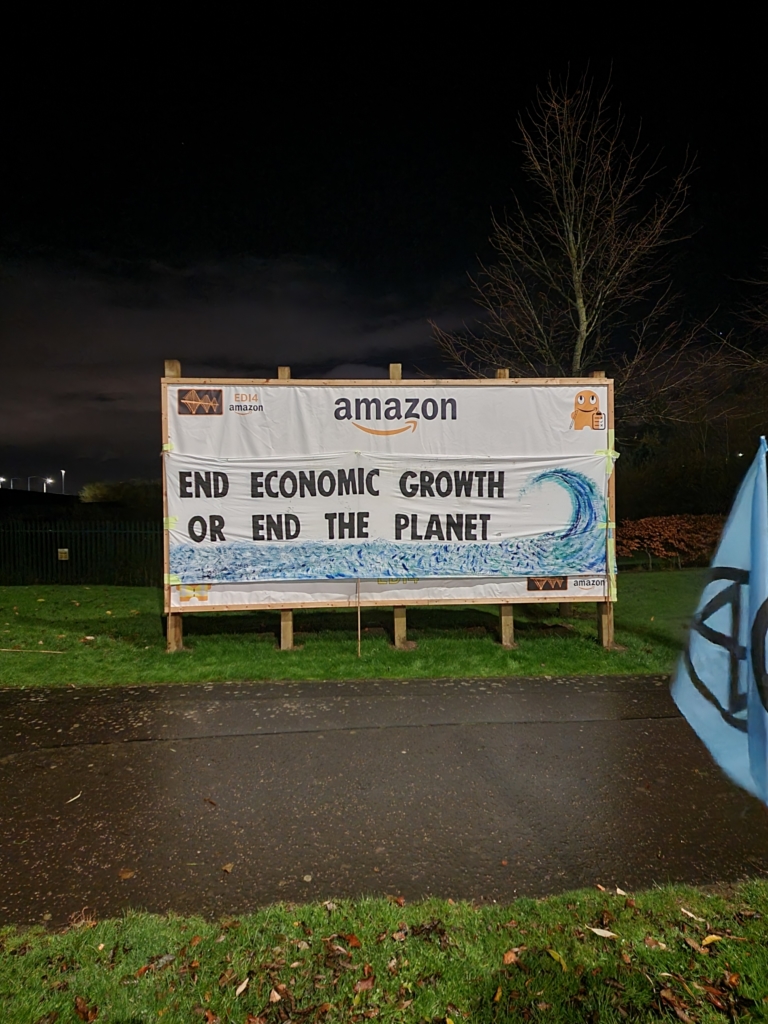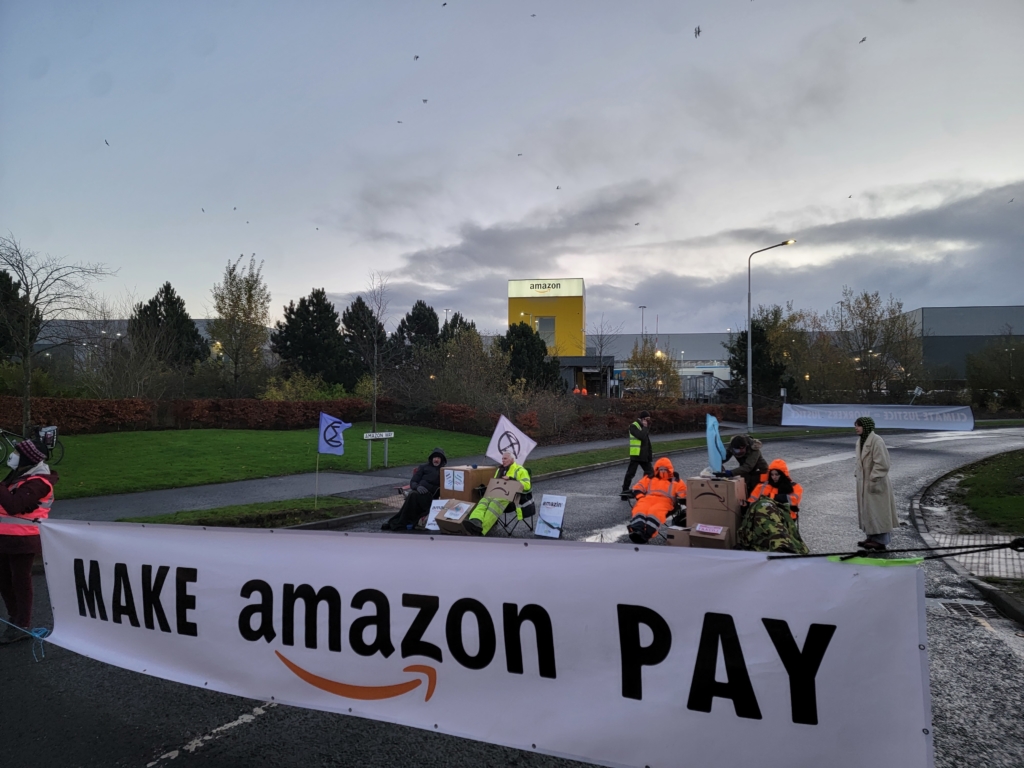Black Friday – Global Action against Amazon


Amazon’s fulfillment center in Dunfermline, Fife, the biggest distribution center in the UK, is being blocked by climate activists who are disrupting the company’s business on its busiest day of the year. The action is intended to draw attention to Amazon’s exploitative and environmentally destructive business practices, disregard for workers’ rights in the name of company profits, as well as the wastefulness of Black Friday.
The group is blocking the entrances using lock-ons, and banners with the words ‘MAKE AMAZON PAY’ and ‘CLIMATE JUSTICE = WORKER’S JUSTICE’ on them.
As we reported earlier this year on Amazon’s unimaginable amount of unnecessary waste in their Destruction Zones. Hidden camera showed Amazon throwing away 124,000 brand-new or returned items, per week, from ONE warehouse. We are only a few weeks from COP26 and today – Black Friday – the whole system is an orgy of mindless consumerism.
The blockade is part of an international action by Extinction Rebellion targeting 15 Amazon fulfillment centers in the UK, US, Germany, and the Netherlands aimed at highlighting Amazon’s “crimes”. This is happening in solidarity with activists and workers from the global ‘Make Amazon Pay’ campaign, demanding better working conditions, clear environmental commitments, and for Amazon to pay their fair share of tax.


A statement from XR said:
“From 5am this morning, Extinction Rebellion has blocked a total of 15 Amazon fulfilment centres in the UK, Germany and the Netherlands on Black Friday, the major global discount day. In the UK, people from all across the country are taking part, with 13 blockades in Doncaster, Darlington, Newcastle, Manchester, Peterborough, Derby, Coventry, Rugeley, Dartford, Bristol, Tilbury, Milton Keynes and Dunfermline. These sites account for just over 50% of Amazon deliveries in the UK.
The group is blocking the entrances using bamboo structures, lock-ons, and banners with the words ‘AMAZON CRIME’, ‘INFINITE GROWTH, FINITE PLANET’ and ‘BLACK FRIDAY EXPLOITS PEOPLE AND PLANET’ on them. In Tilbury, a rocket part blocked the entrance with an eager Jeff Bezos sat riding it, and the words ‘TO EXTINCTION AND BEYOND’ written on its side. The group intends to stay for at least 48 hours.
The action is taking place on Black Friday in order to confront the exploitative and environmentally destructive business practices of one of the world’s largest companies. Amazon is known for a long list of widely recognised “crimes” – from tax avoidance to the exploitation of workers, to rampant wastefulness and ecological destruction – while making its founder and largest shareholder Jeff Bezos one of the richest men on earth. The action aims to expose Amazon’s crimes, while holding it up as an example of the wider economic system, which is designed to keep us hooked on buying things we don’t need, at a price the planet cannot afford.
Black Friday epitomises an obsession with overconsumption that is not consistent with a liveable planet.”


They outline Amazon’s crime as:
1. The company said activities tied to its businesses emitted 60.64 million metric tons of carbon dioxide last year — more than a medium sized country and the equivalent of burning through 140 million barrels of oil. Amazon’s carbon emissions grew by 19% in 2020 and have risen every year since 2018, when it first disclosed its carbon footprint after employees pressured it to do so.
2. Not only does Amazon’s business emit more carbon than a country the size of Denmark, but it is actively helping fossil fuel companies such as Shell, Exxon and BP to drill for more oil via its Amazon Web Services.
3. While scientists tell us that companies must rapidly decarbonise, Amazon continues to lobby the US Government to fight against climate legislation, despite pledging to reach Net Zero carbon emissions by 2040. This target also does not include its supply chain which contributes 75% of its overall emissions and so far it has published no plan on how it intends to meet this target. They are committing the very definition of greenwash.
4. Amazon has a historic record of treating its workers “like robots”, with a report just released on Wednesday this week stating that ambulances have been called out to UK warehouses 971 times since 2018, with the company threatening to fire employees in the US for speaking out about its climate impact.[9][10] An employee died at the site in Tilbury just last month.
5. Amazon routinely destroys millions of items of unsold stock and returned items. Many of the products – including smart TVs and laptops – are often new and unused. This wasteful practice epitomises the view that the natural world is expendable.
6. Governments are subsidising the growth of this massive monopoly by allowing the e-commerce giant to legally report billions of pounds of sales in a tax haven, meaning they are stealing from the general public in order to grow. This helps Amazon to undercut more responsible businesses and is depriving governments of tax revenue that could be used to fund essential public services.
These business practices have helped Amazon’s founder and largest shareholder, Jeff Bezos, to become the world’s richest man, while keeping many workers on the poverty line. According to Forbes, Bezos personal wealth amounts to $177bn.
The blockade is part of an international action by Extinction Rebellion targeting 15 Amazon fulfillment centers in the UK, US, Germany, and the Netherlands aimed at highlighting Amazon’s “crimes”. This is happening in solidarity with activists and workers from the global ‘Make Amazon Pay’ campaign, demanding better working conditions, clear environmental commitments, and for Amazon to pay their fair share of tax.
Eleanor Harris, from Glasgow, said “ It is essential we move to a new model of economics that prioritizes wellbeing and sustainability over profit. The era of exploitative throw-away capitalism will soon be over, either by changing to meet the challenges we now face or by the destruction of our global habitats and societies.”

Help to support independent Scottish journalism by subscribing or donating today.

”Amazon’s Fulfillment Centre ” ”We’re not in Kansas anymore , Toto !”
Last night, I heard on the wireless an e-scooter salesman refer to ‘neurological protection equipment’. I think he meant ‘a helmet’.
The power of jargon… I bet you can get more for an item of ‘neurological protection equipment’ in the marketplace than you can for a humble ‘helmet’. And I know I’d rather my neurological protection equipment was delivered from a swanky ‘fulfilment centre’ than a common ‘warehouse’.
A monopoly, perhaps almost, but the solution is not more (even more wasteful) competition, surely. If our public libraries had a fraction of Amazon’s resources, they could provide a wealth of books and digital services to everyone. Simplistic calculations based on size fall into the same trap as blaming climate change on China. There are aspects of Amazon that, if abstracted from their planet-consuming business, can be applied with benefits for global human society. For example, web services can reduce energy-and-material waste in inefficient local computing, and digital-media online on demand reduces material consumption, while data centres can run on renewable energy with natural cooling.
My recollection is that before the rise of Amazon the bookseller, there was a perception of a crisis in reading, and it was very difficult or time-consuming to obtain specialist and not-very-obscure texts, or in formats like audiobooks or accessible electronic text. Obviously, these can be provided in quite different ways from Amazon’s model or its commercial rivals, but Amazon should have some credit for the democratisation of ideas.
I have no beef with Extinction Rebellion’s protests, but when we are replacing Amazon, we shouldn’t throw the baby out with the bathwater. World literature is a global commons that Amazon has provided access to for many, even if its model is profitarian, polluting, exploitative and unsustainable, and its corporate power undermines popular representation and public financing.
Yep, digital platforms and file-sharing make it much easier for creators to distribute their content and users to access that content. The big problem with Amazon and other commercial platforms is that they obstruct file-sharing among users to artificially maintain scarcity and thereby maximise profit. Like all commercial platforms, big and small, Amazon’s all about commodification and the monetising of goods and services.
@Mons Meg, hardly. It is the creators who decide to impose copyright restrictions that prohibit file sharing, not intermediaries like Amazon. It is entirely feasible for creators to waive some of their rights if they choose, for example:
https://creativecommons.org
I look at Amazon, and the one thing I cannot see is “artificially maintain[ed] scarcity”. I read an article recently by a media studies academic who felt unable to keep up with all the ‘good’ television, let alone all the other media. And the oldest material is continually being updated, remastered/restored, repackaged and (in Doctor Who, for example) missing classic episodes reconstructed via animation. Even where language could be a barrier, shows are relentlessly exported even if the subtitles are not up to scratch.
I would suppose that gatekeepers like those at the British Library information desk are more of an obstacle than Amazon (who unlike BL helped me find resources in my amateur research on forced labour in the British Empire).
You’re right. I stand corrected. It’s the publisher rather than Amazon who seeks to monetise content by restricting our access to that content (i.e. by making it ‘scarce’ in the economic sense) by putting it behind a paywall. Amazon is just the distribution channel (‘bookshop’) through which the publisher sells content; as such, it’s entirely innocent of the behaviour I ascribed to it.
Funnily enough Robert Maxwell got his start in wealth-building by publishing academic texts in a monopoly environment. With a little help from the UK’s secret services who (allegedly) provided seed capital.
“Fall: The Mystery of Robert Maxwell” by John Preston , Penguin.
https://www.foyles.co.uk/witem/biography/fall-the-mystery-of-robert-maxwell,john-preston-9780241388686
@Wul, the open textbooks of the Open Educational Resources movement has been particularly successful in the USA where vast overcharging (price gouging) on academic textbooks goes on.
https://www.oercommons.org/hubs/open-textbooks
And if James Loewen is to be believed, the standard of the paid-for textbooks, at least in USAmerican history schoolbooks, can be pretty dire. School libraries continue to be a culture-wars battleground over there, it seems. But I don’t see Amazon as playing a significant part in jacking up book prices or that kind of censorship.
However, as I have mentioned before, the kinds of books I need for my amateur research on forced labour in the British Empire remain very costly, even if Amazon makes them available in ways that British public libraries do not. If Amazon paid fair taxes then potentially we could spend much more on public libraries in the UK, but would we? After all, the Conservatives keep winning elections, and corporate capture of government is in danger of killing the host.
I think part of the social mindset change required is to place appropriate value on free resources like OER, and work collectively to improve idea commons, and where everyone can be both contributor and user, proprietary formats and restrictions will become less tolerable.
By the way, even Verso contributors may think Amazon has helped make books and bookshops cool again (partly through ebooks) and independent bookshops may now benefit as people turn away from Amazon due to its business practices.
Thanks SD,
You remind us that more open access to knowledge is no small thing and needs to be nurtured. Also, that few things (e.g. Amazon) are ALL bad or ALL good. The trick is to make things work in a fair way that doesn’t endanger us.
We are a consumer society. Stop or reduce dramatically your consumption. Stop eating meat and ban all leather goods. If there is no demand there will be no need to cut down forests to make way for cattle. Buy used clothes and stop buying clothes just because it’s the season. Make your clothes last. Insist that food chains do not waste or throw away unused food. Get them to sell at 50% reduction all food getting to sell by date. The list is long. It is up to us now by boycotting excessive luxury consumer products. This is our planet. No one elses
But the fact is that there is such demand, and telling folk to ‘just don’t do it’ is a bit like telling an alcoholic to ‘just don’t drink’.
Our ever-growing demand for consumer goods is part of the deconstruction of capitalism; like overproduction, overconsumption is one of the structural crises that will inevitably bring the current world crashing down about our ears. As such, it’s to be encouraged.
Outstanding, Michael–both for you and for this site. You are an ally of the struggle for life on this planet, and that makes you a comrade in the struggle that matters most.
As amoral as Amazon’s business model is, it is all perfectly legal. It is our government and it’s policies which enable this form of human and environmental exploitation. We need to demand our governments make changes which outlaw this way of extracting wealth from society and concentrating it within one company.
All those Amazon warehouse workers and van drivers and customers are kept healthy and educated by the state. All the roads, infrastructure, rule of law and protection of life and property that Amazon relies on to carry out its business are provided by us, the people. And yet Amazon is required to give almost nothing back in return. It is given free reign to plunder our country’s people, our wealth and the world’s resources. This needs to stop.
It is a miracle of human ingenuity that we can make smart TVs so cheaply that it is cheaper to dump them than sell them second-hand. If this ingenuity were applied to something more useful like, say, providing access to a toilet to the 40% of human beings who are without, then the world could be a better place.
Could we train people like Bezos to accrue “Good Global Citizen” tokens instead of dollars? Could we make the status and power of a man dependant on his good deeds in the world? People like Bezos and Branson et al will perform amazing feats to accrue whatever tokens society values. They could be loved for their actions rather than their cash. A real business should enrich the lives of all who deal with it.